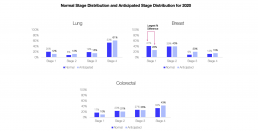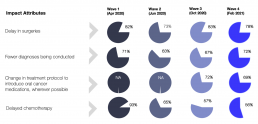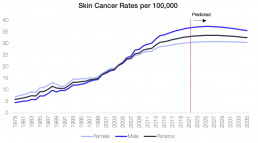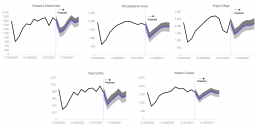Now, more than a year on from the first realisations of the true impact Covid-19 was to have across the globe, the time to address what is not just a crisis born of the effects of a virus of this magnitude, but also of a wider spread healthcare challenge, is more urgent than ever.
120%! NHS England’s new “elective recovery accelerator” programme is set to see selected health systems offered £10-20m in additional funding if they commit to delivering 120% of their pre-Covid elective activity levels by July 2021. It comes with a 24,275% rise in the number of year-long waiters, from 1,600 pre-pandemic to 390,000 as of February 2021. A fresh attempt to encourage greater ambition amongst ICSs as they tackle the planning of their service restoration journey, achieving this level of activity will be no mean feat. It is undoubtable that, with this form of accelerated clinical and operational delivery demand, comes a strong need for forward-looking approaches, data accountability, quality and risk management – all driven by sound data solutions. Signup for DataX 21 cancer recovery data workshop
An Electives Crisis in Cancer Care
The arrival of the pandemic brought with it growing alarm surrounding the services hit hard by the downstream blow dealt to elective pathways, indirect deaths from delayed cancer diagnosis and treatment soon predicted to exceed those even of the virus itself. With “deeper wounds” inflicted by the halting of drug and diagnostic discovery and development, labs locked down and clinical trials suspended, it’s estimated that 18 months of progress in the oncology field has been lost as a result of the pandemic.

With every new report of the struggles patients and providers now face in dealing with cancer care recovery – each week’s delay to referral bringing with it an estimated 1% reduction in a patient’s chance of survival – I have seen stark and multiplying reminders that there is much left to be done to prevent what could otherwise be avoidable harm to patients. Looking across the healthcare and life science landscape, and the challenges faced by colleagues across these sectors, my confidence in the vital role data- and technology-driven change will need to play in order to create novel strategies and solutions for the fight ahead has only strengthened.
Each day, our healthcare providers and workforce continue to face the long road to recovery that comes as we now begin to see light on the pandemic’s horizon. Accelerating these efforts to meet delayed cancer care demand will rely on intensive and forward-looking preparation, driven by harnessing of the data and digital tools available to us. In light of this, we continue to do our part in modelling the impact of Covid-19 on cancer services as a means by which to support our healthcare practitioners day-to-day and into the foreseeable future. Demand predictions reinforced by a host of curated insights from the Draper & Dash Health Data Science Platform (DSP) form the foundation of our efforts to bolster the recovery pathways of providers across the spectrum, answering the questions of what needs to be done both now and into the future.

A Time Sensitive Challenge
Recent analysis has stressed a particular point of concern within the cancer landscape. A sector already plagued by delays to diagnosis and treatment, many patients avoiding a trip to their GP to lessen the burden on an already stressed health system or simply unable to access services limited by the pandemic, one of the country’s most common forms of cancer has seen “truly alarming” drops in the rates of diagnosis.
This is a glaring contrast to what had prior to the pandemic been the fastest growing form of cancer in the UK, irrespective of age. From its rate 20 years, the number of patients with skin cancer has now doubled, those detected at later stages often facing treatment that is able only to slow the spread and reduce the symptoms of cancer as opposed to successfully remove it.
With poorer prognoses, compounded by more complicated and costly treatment pathways, we are continuing to see the severe impact of Covid-19 upon the rates and speed of diagnosis across the country. The number of urgent referrals for suspected skin cancer has seen a sharp drop by 20% from March 2020 to February 2021 in comparison to 2019-20 figures, an estimated 101,000 fewer people having been seen as a result.
Each of these patients face the risk of diagnosis at a more advanced stage of disease – stages that may even be too late to treat. With a similar drop in the number of patients being diagnosed with the deadliest form of skin cancer, melanoma, at 28% between April and November 2020, Dr Zoe Venables of Norfolk and Norwich University Hospitals NHS Foundation Trust highlights an increasing awareness that “the Covid-19 pandemic has effects far beyond those immediately infected by the virus.”

Effects Felt Across the NHS
Indeed, the impact of Covid-19 upon trust capacity for diagnostic services and urgent treatment has been felt across the NHS, and is set to see some severe long-term consequences for patients and providers. Professor Clive Kay, CEO of King’s College Hospital NHS Foundation Trust, emphasised the significant pressure placed upon trust services as a result of the surge in admissions seen particularly during the second Covid-19 wave – soaring at 68.7% higher than that of the first wave.
In the trust’s March board paper, as with many others across the NHS, the outlook for elective care recovery surrounding cancer pathways was notably foreboding for the long-term impacts of Covid-19 upon patients awaiting these services. With “a reduction in pathway completion through treatment, and an increase in pathways without a defined treatment plan due to delays in the completion of diagnostic tests,” each week that passes will in too many cases equate to patients facing progression to more advanced and untreatable stages of cancer. With 62 Day GP Referred First Treatments at 58.28% as of the most recent January 2021 position, well below the 85% target, it is essential for the trust and many like it working diligently on the frontlines of this war against Covid-19 to leverage the tools available for careful modelling and recovery planning into the coming months.

Meeting the Crisis Head On | Data and Technology as Drivers for Change
What we have seen across the cancer landscape is not something that will simply resolve itself with time and a return to normal. An existing challenge only exacerbated to extreme and deeply harmful levels over the pandemic’s course, the true impact this will have upon patients with cancer – an impact that has sadly already been felt by too many the world over – is one that requires swift action to prevent further avoidable damage. To prepare for the future and ensure it is one that sees significant improvements and brighter outlooks for those affected by this disease, leveraging what we know about past and developing trends is truly crucial.
Backed by in-depth and granular data at a historic and real-time, provider and national scale, we have as such created a new report that explores the breadth of the cancer care landscape and impact of Covid-19. I invite any colleagues wishing to uncover these insights in full to download our complete report here.
For those interested in better understanding the heart of these insights and predictions, created from the advanced AI/ML and data-driven technology of the DSP, to further support your own strategic planning through powerful real-time and predictive analytics, we encourage you try the DSP for yourselves. To access a free trial of the platform, contact us at info@draperanddash.com.